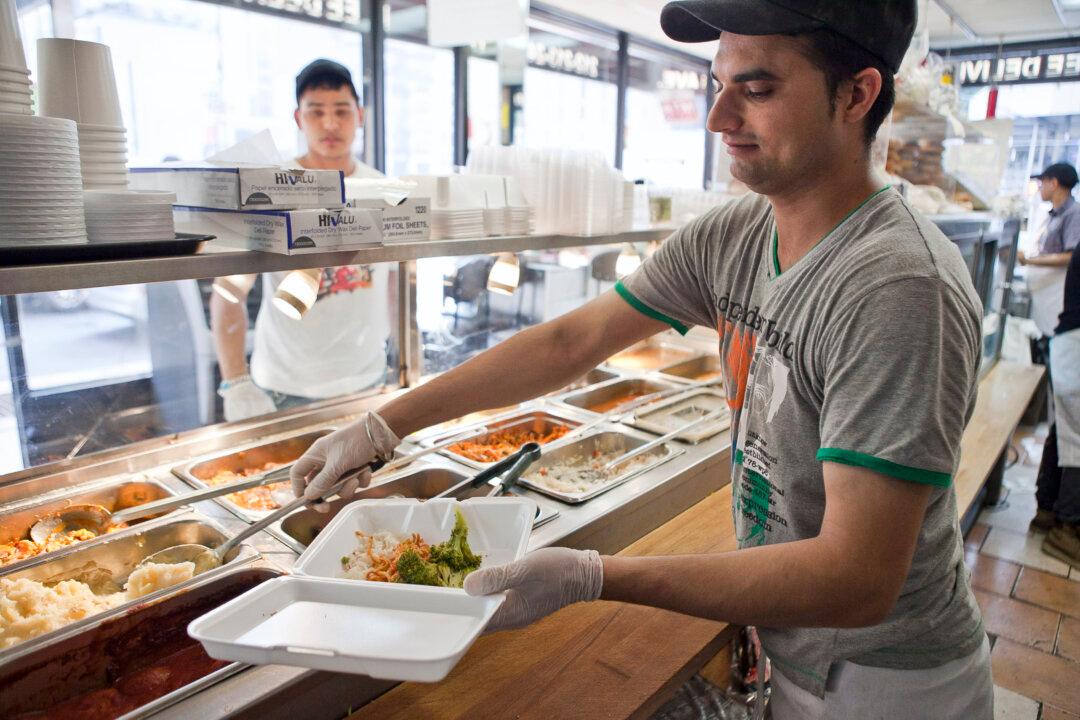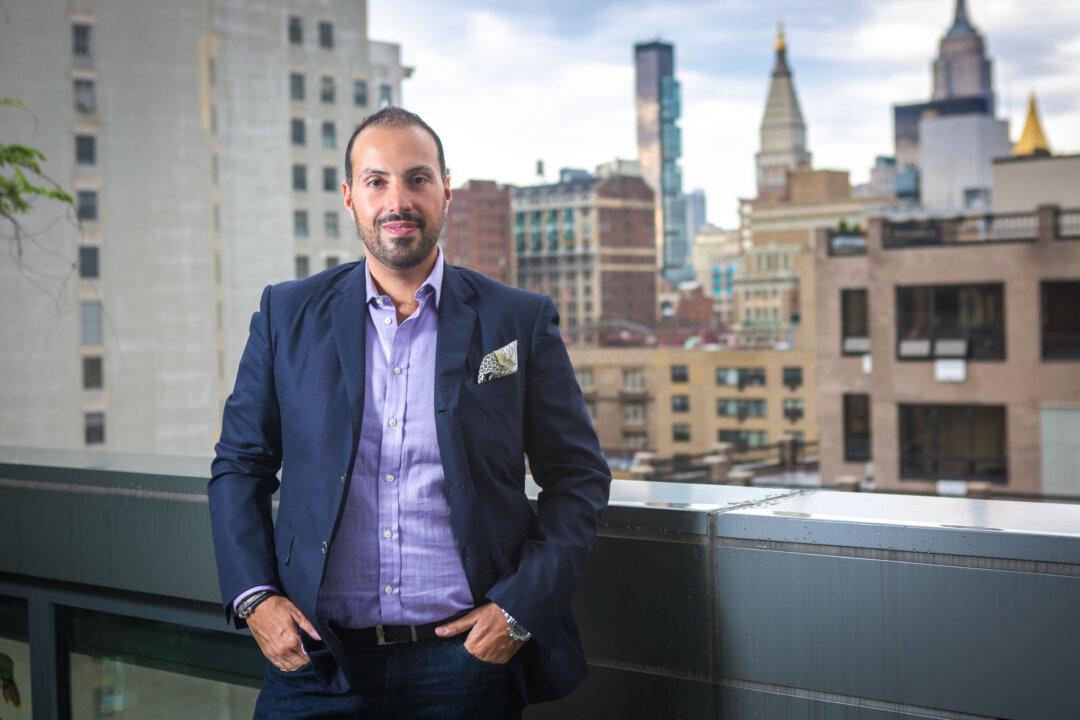NEW YORK—Restaurant owners have been inadvertently lobbying government on behalf of chemical companies, Epoch Times has discovered.
Since May, the Restaurant Action Alliance NYC (Restaurant Alliance) has recruited around 2,300 New York City restaurant owners to send letters to City Hall asking council members to oppose a proposed ban on polystyrene containers, the foam containers frequently used for restaurant takeout.
A sample letter on the Restaurant Alliance’s campaign website, “Put a Lid on It NYC,” it reads, “This is just one more example of out-of-touch elected officials—who have no idea what it takes to run a small business in New York City—trampling the rights and interests of the people who make our City thrive.
“A ban will increase my costs, hurting my bottom line and my ability to grow my business. It will force me to use inferior alternatives that cost more.”
The Restaurant Alliance markets itself as a grass-roots organization concerned about the interests of small-business owners, but it is sponsored by The American Chemical Council (ACC), a lobby group that represents some of the nation’s largest chemical manufacturers, including the manufacturers of polystyrene foam. A single mention of ACC on Restaurant Alliance website is a copyright message in small print in the footer.
Warren Robinson, a spokesman for the Restaurant Alliance, who also works for the ACC, cited a study that found the proposed ban would cost NYC businesses, consumers, and agencies at least an additional $91.3 million per year because they would be forced to switch to higher-cost alternatives.
Robinson also said foam packaging uses less energy and resources to manufacture than comparable paper-based products.
The restaurant owners who contacted City Council were not told about the relationship between the Restaurant Alliance and the ACC.
Neither, apparently, was an elected city official.
Council member Maria del Carmen Arroyo joined two representatives of the Restaurant Alliance on a tour of five Bronx restaurants, near her office on Aug. 30.
Arroyo, as chair of the NYC Council Committee on Health, said she was there to hear the owners’ concerns about the potential ban on polystyrene foam.
At the time of the tour Arroyo did not know of the relationship between the Restaurant Alliance and the ACC, her spokesman Michael Drezin said Sept. 12.
“It would be correct to say that Council member Arroyo was not aware that the Restaurant Action Alliance is, at the very least, sponsored by a giant chemical alliance, and she finds the news disturbing and something that she is going to look into,” Drezin said.
The first owner the group visited during the tour, Pablo Martinez, said Myriam Hernandez, the community organizer for the Restaurant Alliance, had asked him to join in the campaign.
Martinez willingly joined the campaign. He said alternatives to polystyrene foam packaging were far more expensive, and would affect his profit margins. Alternative takeout containers cost more than four times the price, according to restaurant owners.
Martinez had paid hundreds of dollars in fines to the city Health Department for violations found during inspections, and was worried about paying more money for packaging. “My son is in college,” he said.
Martinez said he did not know about the relationship between the Restaurant Alliance and the ACC. “I feel a little confused,” he said, speaking through a translator on Sept. 11.
Martinez said he still hoped the ban would not go through, or that some manufacturers could provide a cheaper alternative for businesses like his.
Another restaurant owner, Thomas Lekkas, in Midtown Manhattan, was approached by the Restaurant Alliance in May.
He said that although his Greek restaurant did not use that many polystyrene foam containers, he had joined the Restaurant Alliance because he was fed up with Mayor Michael Bloomberg’s policies surrounding public health and callous health inspectors.
He said the representatives of the Restaurant Alliance had talked about the hefty fines from the Health Department when they recruited him.
Learning of the connection between the Restaurant Alliance and the ACC, Lekkas said he felt less enthusiastic about supporting the campaign.
“I prefer to fight for the rights of the city, what he [Bloomberg] does to us,” he said. “Even the water is more expensive than gasoline—they just raised the price again.”
Council member Lewis Fidler introduced legislation to ban polystyrene in June. If passed it would ban polystyrene packaging for food items from July 1, 2015, and also prohibit the manufacture of polystyrene foam in New York City.
The bill came at the request of Bloomberg, who during his final “State of the City” speech in February mentioned working with City Council and Speaker Christine Quinn to ban polystyrene packaging.
Bloomberg has said polystyrene foam increases the cost of recycling by as much as $20 per ton, because it has to be removed.
Each year Americans throw away 25,000,000 foam cups, which take 500 years or more to break down, according to the U.S. Environmental Protection Agency.
A bill to recycle polystyrene foam was sponsored by Council member Peter Vallone Jr. in 2010, but it was not adopted. He is undecided about whether to resubmit the bill at this time.
Vallone said he has met with representatives from DART Container, the world’s largest manufacturer of foam cups.
DART had proposed a plan to recycle expanded polystyrene in New York City. The company said it had secured a buyer, Indianapolis-based Plastic Recycling Inc., that is willing to pay $160 a ton for the waste product.
“The big problem is they are only guaranteeing a contract with the city for five years. The city normally likes a 20-year contract because of the tremendous costs involved,” Vallone said.
Michael Westerfield, the corporate director of DART’s recycling programs, told the Epoch Times the recycling proposal was only offered to the city by DART Containers, and was independent of any other manufacturers or lobby groups.
Vallone said he was concerned “about what the proponents of recycling—who are actually the industry—are telling the restaurants and elected officials.”
A local company from Bloomfield, N.Y., Commodore Plastics LLC, has about 30 employees involved in manufacturing the equipment used to make polystyrene foam. The remaining employees, almost 150, mainly produce the foam used for meat trays in supermarkets.
President Brad Braddon said his company had been a member of the ACC for about five years, “because they have the ability to make our voice heard.”
He said he learned about the Restaurant Alliance through the ACC, but he didn’t know that ACC had sponsored it. “I guess I don’t know that much about it,” he said.





